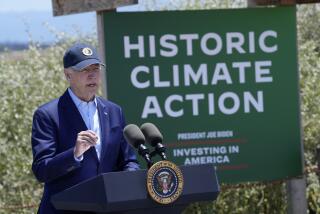Obama administration bans Arctic offshore oil drilling through 2022. But will Trump reverse it?
Reporting from Seattle — The Obama administration said Friday it was banning offshore oil drilling in the Arctic through 2022, a move that prompted widespread praise from conservation groups but raised questions over how long the decision will stand just two months before President-elect Donald Trump takes office.
A new five-year leasing program prohibits any drilling in the Beaufort and Chukchi seas — an environmental battleground in recent years —and also blocks expansion in the Atlantic and Pacific oceans, while allowing some new leasing in the Gulf of Mexico.
As recently as this spring, the administration was still considering selling leases to drill for oil in the Arctic beginning in 2017. But environmental concerns, limited interest from the oil industry and low oil prices helped shift its thinking.
“The plan focuses lease sales in the best places – those with the highest resource potential, lowest conflict and established infrastructure – and removes regions that are simply not right to lease,” said Interior Secretary Sally Jewell. “Given the unique and challenging Arctic environment and industry’s declining interest in the area, forgoing lease sales in the Arctic is the right path forward.”
The plan, which preserves a drilling ban off most of the California coast, leaves the Gulf of Mexico as the only major source of offshore drilling in U.S. waters. The administration said it would offer one lease in Alaska’s Cook Inlet, where oil and gas have long been produced in state waters.
The only company to actively pursue offshore drilling in the Arctic in recent years is Royal Dutch Shell, which invested more than $7 billion and endured a string of legal and logistical setbacks before finally beginning exploratory drilling in the summer of 2015 in the Chukchi Sea.
The actual drilling did not last long. In late September of that year, Shell announced it was abandoning the efforts “for the foreseeable future” because of challenging economic conditions, including consistently low oil prices, and what it said were disappointing results from its explorations.
The following month, the administration canceled remaining planned lease sales in the Arctic during the current five-year period. It also denied industry requests to extend leases.
Protecting the fragile and remote Arctic, which is home to endangered whales and walruses and the subsistence hunting traditions of indigenous Alaskans, has long been a high priority among environmental groups. They uniformly praised the move Friday, emphasizing the benefits of limiting fossil fuel production to combat climate change, though some also called for the administration to enact a permanent ban.
“This is a significant milestone in protecting the fragile Arctic Ocean and limiting climate change,” said Rhea Suh, president of the Natural Resources Defense Council. “And the president has the authority to do even more. He can ban dangerous oil and gas drilling in the Arctic — and the Atlantic — for all time.”
California and other West Coast advocates have made similar requests for a permanent ban. On Wednesday, all six Democratic senators from California, Oregon and Washington thanked President Obama for his “administration’s ongoing commitment to keep new West Coast lease sales off of the table. However, without a permanent withdrawal, we cannot be certain that the coastline would not see new oil and gas development in the future.”
Industry groups quickly attacked the decision and expressed hope that Trump would reverse it when he takes office. The president-elect has pledged to aggressively roll back environmental regulations and expand fossil fuel development.
Yet undoing the new leasing plan could take anywhere from several months to two years. In addition, it is unclear how much interest industry will have in making the enormous investment necessary to work in the Arctic, particularly given Shell’s experience. The price of oil, currently about $45 per barrel, has risen this year, but it is nowhere near the levels of $100 or more it reached when Shell was most assertive in pursuing the Arctic.
Practical questions did not stop conservative lawmakers from criticizing the plan, particularly those from Alaska. U.S. Sen. Lisa Murkowski (R-Alaska) said she was “infuriated” by the decision. She and other critics have accused the Obama administration of ceding Arctic energy development to Russia and other nations.
On Friday, the Alaska congressional delegation cited a 2011 private-sector analysis that said extracting the 24 billion barrels of oil and 104 trillion cubic feet of natural gas believed to be below the Arctic seafloor would create 55,000 jobs annually over a 50-year period and bring in $193 billion in revenue for local, state and federal governments.
They pointed to polls showing that a large majority of Alaska residents support offshore drilling. The state, which relies almost exclusively on revenues from oil production to pay its bills, is facing drastic budget cuts because of declines in production on its North Slope.
“We have shown that Arctic development is one of the best ways to create jobs, generate revenues, and refill the Trans-Alaska Pipeline,” said Murkowski, who is chairwoman of the Senate Energy and Natural Resources Committee. “Why the president is willing to send all of those benefits overseas is beyond explanation.”
She added, “I will do all that I can to counteract this shortsighted decision.”
Follow @yardleyLAT on Twitter.
More to Read
Sign up for Essential California
The most important California stories and recommendations in your inbox every morning.
You may occasionally receive promotional content from the Los Angeles Times.











